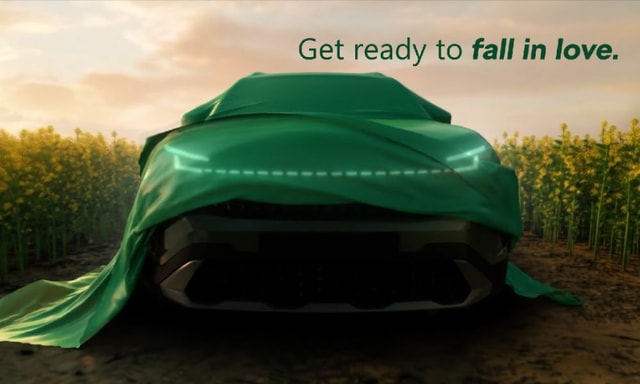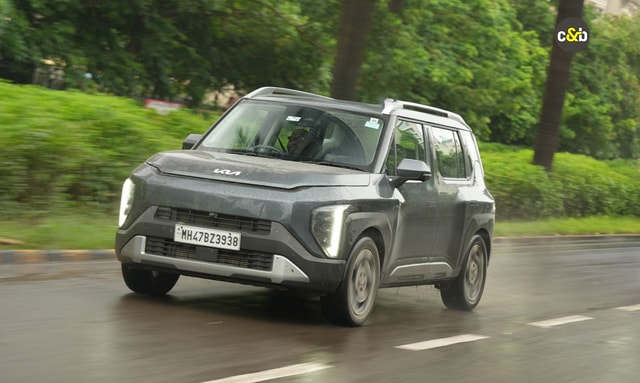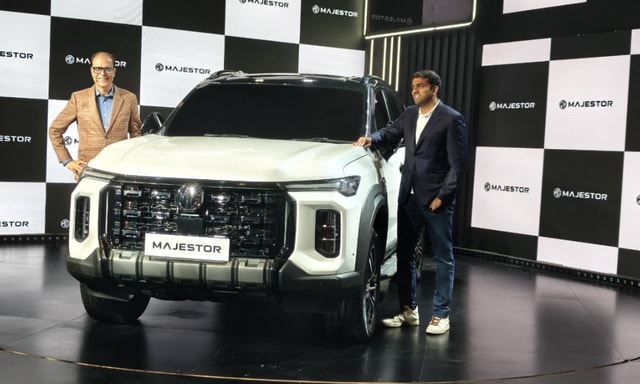Build Or Buy? Automakers Chasing Tesla Rethink Dependence On Suppliers

Automakers racing to develop battery-powered, software-driven vehicles to compete with Tesla Inc are confronting a new challenge: what technology to build themselves, and what to keep buying from suppliers. Becoming more vertically integrated by doing more manufacturing in-house represents a major shift for most global automakers, who have relied for decades on suppliers to produce critical parts and software, and manage sprawling manufacturing networks in low-wage countries. But some established automakers are embracing drastic changes to their longstanding build-or-buy calculations. One factor is the success of Tesla's electric vehicles, which rely on proprietary technology the company develops and manufactures itself. Another is the financial damage done by supply-chain breakdowns during the pandemic.
"The most important thing is we vertically integrate. Henry Ford ... was right," Ford Motor Co's CEO, Jim Farley, said at a conference in earlier this month. Farley's reference was to company founder Henry Ford's Rouge manufacturing complex in Dearborn, Michigan, which in the early 20th Century took in iron ore and other raw materials at one end, and churned Model Ts off the assembly line at the other.
Farley said the company had to move away from its early EV strategy of buying components off the shelf. Now, he said, Ford aims to control the supply chains "all the way back to the mines" that produce battery materials.
Rivals including Volkswagen AG, General Motors Co and Mercedes-Benz AG are pursuing similar strategies. Mercedes last year acquired British high-performance electric motor manufacturer YASA, and has retooled a factory near Berlin to produce motors based on YASA technology. The German luxury car maker in March opened a new factory in Alabama to build battery packs for U.S.-made electric vehicles, and said it will partner with Japanese battery maker Envision AESC to build battery cells in the United States.
"We are going deep into sourcing," Mercedes-Benz Chief Executive Ola Kaellenius told reporters during a briefing in Alabama.

Rivals including Volkswagen AG, General Motors Co and Mercedes-Benz AG are pursuing similar strategies of controlling the supply chains
WINNING STRATEGY
The investments by automakers in mines, motors and batteries are a departure from decades of handing control over development and production to suppliers, who could produce steering controls, semiconductors and electronic components at greater scale and lower cost for multiple vehicle manufacturers.
In the new world of electric vehicles, however, investors have decided that Tesla's approach of buying raw materials directly, building its own batteries and engineering its own software is the winning strategy. Tesla's market capitalization has soared back above $1 trillion in recent weeks, outweighing that of Toyota Motor Corp, Volkswagen, GM and Ford combined.
"Major players have realized electric vehicles are the future, but they have yet to widely recognize that they have to up their game in terms of motors, transmissions, battery technologies, inverters and electric powertrains," Peter Rawlinson, CEO of EV startup Lucid Group Inc, said in an interview with Reuters. Rawlinson previously was vice president of vehicle engineering at Tesla.
Between the 1970s and the 2010s, the share of automaker-owned intellectual property in their vehicles decreased from 90% to 50%, according to Guidehouse Insights analyst Sam Abuelsamid.
That meant many automakers lacked the in-house engineering expertise to develop their own electric vehicle platforms, powertrains and battery packs when EV pioneer Tesla showed its vertically integrated cars were a hit with consumers.
"We're designing and building so much more of the car than other OEMs who will largely go to the traditional supply base and [execute] like I call it, catalog engineering," Tesla CEO Elon Musk said during a 2020 earnings call.
Tesla's approach is costly and the company has raised vehicle prices repeatedly in the last few years. Despite promising to deliver a model that could start at about $25,000, Musk earlier this year said "we're not currently working on the $25,000 car. At some point, we will. But we have enough on our plate right now."
TECHNOLOGY RACE
There is also a gap between what automakers say about their vertical integration strategies, and what happens as engineers try to meet deadlines to deliver new vehicles, supplier industry executives said.
"There's a lot of narrative about in-sourcing and vertically integrating, especially in areas like software," Kevin Clark, chief executive of auto supplier Aptiv Plc, told analysts in February. "Virtually all the OEMs that we are doing business with are struggling with software development."
Xavier Mosquet, a senior adviser at Boston Consulting Group, said many manufacturers still prefer to buy EV technology to avoid the cost and complexity of manufacturing in-house.
"There are a number of automakers who in a way want to continue buying and manage the final integration," Mosquet said, adding that it would take several years to determine which approach is successful.
Many automakers are also hesitant to completely in-source EV manufacturing at a time when EV purchases still make up only a fraction of total vehicle demand.
Today, only Tesla, EV startup Lucid Group Inc and Chinese BYD Co Ltd are completely making their electric motors in-house, according to IHS Markit, followed by Hyundai Motor Co and the Renault-Nissan-Mitsubishi alliance.
Other carmakers, including Mercedes-Benz Group, Ford and Porsche, are using electric motors by suppliers for their current EV models.
"The electric powertrain cannot be bought off the shelf at a world-class standard, it is not a commodity," Rawlinson said. "This is a technology race and the market doesn't see it yet."
Mercedes said it plans to make electric motors, battery packs and electronics in-house starting in 2024. The company is also working to reduce costs by securing raw materials directly from miners, Chief Technology Officer Markus Schaefer told Reuters.
(This story has not been edited by NDTV staff and is auto-generated from a syndicated feed.)
Latest News
 car&bike Team | Jan 19, 2026Skoda Kushaq Facelift Debut Tomorrow: What To ExpectFacelifted Kushaq to get updated looks and new tech inside the cabin.1 min read
car&bike Team | Jan 19, 2026Skoda Kushaq Facelift Debut Tomorrow: What To ExpectFacelifted Kushaq to get updated looks and new tech inside the cabin.1 min read Jaiveer Mehra | Jan 17, 20262026 Tata Punch Facelift Price, Variants ExplainedUpdated Punch is available in 8 trim levels with naturally aspirated petrol, CNG and turbo-petrol engine options.3 mins read
Jaiveer Mehra | Jan 17, 20262026 Tata Punch Facelift Price, Variants ExplainedUpdated Punch is available in 8 trim levels with naturally aspirated petrol, CNG and turbo-petrol engine options.3 mins read car&bike Team | Jan 17, 2026Skoda Kushaq Facelift Teased Ahead of Launch In Coming WeeksMid-lifecycle update to bring with it styling updates as well as new features inside the cabin.1 min read
car&bike Team | Jan 17, 2026Skoda Kushaq Facelift Teased Ahead of Launch In Coming WeeksMid-lifecycle update to bring with it styling updates as well as new features inside the cabin.1 min read car&bike Team | Jan 16, 2026Pierer Mobility AG Rebranded as Bajaj Mobility AG Following KTM TakeoverThis marks a major shift in ownership and strategic direction in the global motorcycle industry.1 min read
car&bike Team | Jan 16, 2026Pierer Mobility AG Rebranded as Bajaj Mobility AG Following KTM TakeoverThis marks a major shift in ownership and strategic direction in the global motorcycle industry.1 min read Seshan Vijayraghvan | Jan 16, 2026Kia Syros Variant Line-Up Expanded With HTK (EX) Trim; Prices Start At Rs. 9.89 LakhPositioned between the HTK (O) and HTK+ trims, the new variant will be offered in both petrol and diesel options.2 mins read
Seshan Vijayraghvan | Jan 16, 2026Kia Syros Variant Line-Up Expanded With HTK (EX) Trim; Prices Start At Rs. 9.89 LakhPositioned between the HTK (O) and HTK+ trims, the new variant will be offered in both petrol and diesel options.2 mins read car&bike Team | Jan 16, 2026MG Majestor India Launch On February 12Unveiled in India at the 2025 Bharat Mobility Expo, the Majestor is expected to be positioned as a more premium alternative to the Gloster.1 min read
car&bike Team | Jan 16, 2026MG Majestor India Launch On February 12Unveiled in India at the 2025 Bharat Mobility Expo, the Majestor is expected to be positioned as a more premium alternative to the Gloster.1 min read
 Amaan Ahmed | Jan 17, 2026Bajaj Chetak C25 First Ride Review: Basic, Likeable E-Scooter For First-Time RidersThe Chetak C25, in quite a few ways, is poles apart from the larger and more powerful 30 and 35 Series models, but in its mannerisms, it is very much a Chetak.8 mins read
Amaan Ahmed | Jan 17, 2026Bajaj Chetak C25 First Ride Review: Basic, Likeable E-Scooter For First-Time RidersThe Chetak C25, in quite a few ways, is poles apart from the larger and more powerful 30 and 35 Series models, but in its mannerisms, it is very much a Chetak.8 mins read Bilal Firfiray | Jan 9, 2026Toyota Urban Cruiser Hyryder: 10,000 km Long-Term ReviewAfter spending over three months and 10,000 km with the Toyota Urban Cruiser Hyryder Hybrid, we were impressed by its real-world mileage, seamless hybrid, practical comfort, and Toyota reliability. Is it the best C-SUV then?5 mins read
Bilal Firfiray | Jan 9, 2026Toyota Urban Cruiser Hyryder: 10,000 km Long-Term ReviewAfter spending over three months and 10,000 km with the Toyota Urban Cruiser Hyryder Hybrid, we were impressed by its real-world mileage, seamless hybrid, practical comfort, and Toyota reliability. Is it the best C-SUV then?5 mins read Seshan Vijayraghvan | Jan 8, 20262026 Mahindra XUV 7XO Review: Big On Tech, Bigger On ComfortThe new Mahindra XUV 7XO is flashier, feature packed, and comes with more advanced tech. But are the changes just incremental or actually substantial?1 min read
Seshan Vijayraghvan | Jan 8, 20262026 Mahindra XUV 7XO Review: Big On Tech, Bigger On ComfortThe new Mahindra XUV 7XO is flashier, feature packed, and comes with more advanced tech. But are the changes just incremental or actually substantial?1 min read Preetam Bora | Jan 10, 2026Simple One Gen 2 First Ride Review: 265 km Claimed Range!The Gen 2 model of Simple Energy’s first electric scooter gets a fair few updates, including new features, tech, more range and lighter weight. We spent a couple of hours with the Simple One Gen 2 to find out if it manages to impress.6 mins read
Preetam Bora | Jan 10, 2026Simple One Gen 2 First Ride Review: 265 km Claimed Range!The Gen 2 model of Simple Energy’s first electric scooter gets a fair few updates, including new features, tech, more range and lighter weight. We spent a couple of hours with the Simple One Gen 2 to find out if it manages to impress.6 mins read Amaan Ahmed | Jan 3, 2026VLF Mobster 135 300 KM Review: Fun But FlawedA 125 cc scooter with Italian design and Chinese genes is a rare combination, and while some may be tempted to dismiss it because of its origins, the VLF Mobster shows 125s can also be exciting – but not without compromises.11 mins read
Amaan Ahmed | Jan 3, 2026VLF Mobster 135 300 KM Review: Fun But FlawedA 125 cc scooter with Italian design and Chinese genes is a rare combination, and while some may be tempted to dismiss it because of its origins, the VLF Mobster shows 125s can also be exciting – but not without compromises.11 mins read






















































































































